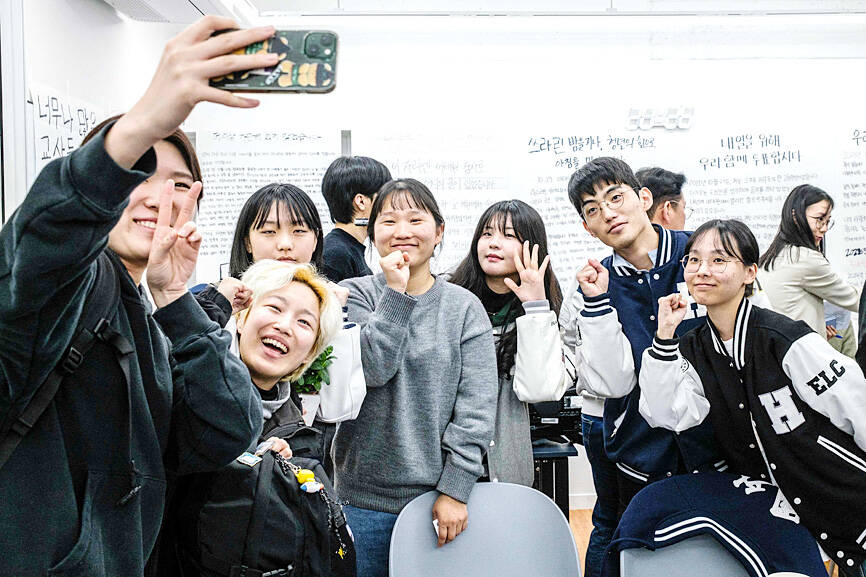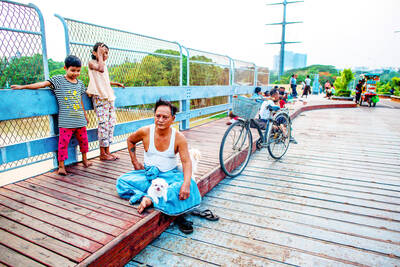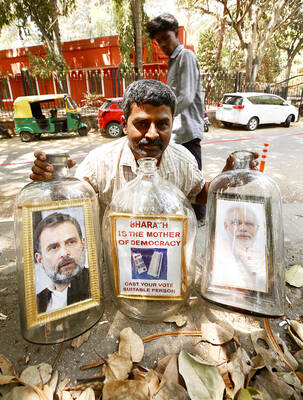Outnumbered by older voters, underrepresented in parliament, ignored on the campaign trail: Young South Koreans say the political system is failing them, and some are fighting back before today’s election.
The poll to choose the National Assembly’s 300 lawmakers is to be the first vote in South Korean history where voters aged 60 or older outnumber those in both their 20s and 30s, official data show.
This is partly demographics. South Korea has the world’s lowest birthrate and is a rapidly aging society, with the number of marriages in free-fall for decades and single-person households now the norm.

Photo: AFP
Politics is also dominated by older men. Male lawmakers older than 50 account for more than 75 percent of the current National Assembly. Just 5.6 percent of candidates for today’s election are younger than 40.
Lee Min-ji, a 23-year-old student at Seoul’s Hankuk University of Foreign Studies, has spent the weeks before the election making handwritten posters trying to get young people to vote.
Like many young South Koreans, she points to a string of scandals as evidence the government is failing the young. That includes 2022’s Halloween crowd crush in Itaewon, which killed more than 150 mostly young people and was blamed on a litany of official oversights.
“Young people are dying every day, while it’s considered a problem that [we are] not getting married and not having children,” one of her posters says, claiming officials unfairly hold young people responsible for a demographic crisis that has been decades of bad policy in the making.
“I’m not sure when they will stop considering it a problem that [babies] are not being born when even the children and young people who are alive now ... cannot be protected,” she said.
Just like many nations, voter turnout in South Korea is lower among the young. Just 57.9 percent of eligible voters in their 20s and 30s cast ballots in the last general election in 2020, compared with 79.3 percent for voters in their 60s and 70s, official statistics show.
Only slightly more than 50 percent of voters between 18 and 29 said they planned to vote in today’s election “no matter what,” according to the latest Gallup Korea poll.
Experts say this is linked to growing dissatisfaction among young people.
While South Korea is seen as a global cultural powerhouse and is known for strong semiconductor exports, domestically the younger generation is struggling, with cut-throat competition in education, fewer employment opportunities and sky-high housing costs.
Suicide is the leading cause of death for South Koreans aged between 10 and 39, official statistics show.
The older establishment class “does not really understand the precarious situation of the youth,” said Shin Gi-wook, a sociology professor at Stanford University, which is a key cause of rising “generational conflict.”
As the nation ages, old people become ever more significant politically.
This “will continue to alienate young people from politics and voting,” said Linda Hasunuma, a political scientist at Temple University in Philadelphia.
“Many already feel that substantive change is not possible with the existing system,” she said. “Because older voters will turn out to vote, we may see policies that overrepresent their interests at the expense of younger voters.”
Yu Jung, 26, lost her younger sister in the Itaewon crowd crush and she feels that many young people are too stressed and overworked to engage in politics — even though the existing system is failing them.
Her late sister, Yu Yeon-ju, had to manage multiple part-time jobs alongside her studies and job preparations on just six hours of sleep a day.
“’Politics that kill’ is not a remote concept. Disasters ... happen when [the state] fails to do what it ought to do,” Yu Jung said.
The state’s failure to protect a 20-year-old Marine doing his mandatory military service, who died last year during flood relief work, also featured in campaign posters created by student activists. Reports claimed he was not issued a life jacket.
“When you are called up [for military service], you’re a son of the nation. When it’s time for them to take responsibility, it’s: ‘Who are you?’” one poster urging young people to vote said.
Lee Cheol-bin, 30, lost his life savings in a jeonse housing scam, which disproportionately affect young people and led to at least four suicides last year.
He urged young people to vote, even if they felt they were “erased” by politics as usual.
“The reason why we have to vote despite everything is ... because we can’t live like this,” he said at an event in Seoul aimed at encouraging young people to vote. “It does not make sense for us to live a life where we can literally just disappear at any moment.”

As the sun sets on another scorching Yangon day, the hot and bothered descend on the Myanmar city’s parks, the coolest place to spend an evening during yet another power blackout. A wave of exceptionally hot weather has blasted Southeast Asia this week, sending the mercury to 45°C and prompting thousands of schools to suspend in-person classes. Even before the chaos and conflict unleashed by the military’s 2021 coup, Myanmar’s creaky and outdated electricity grid struggled to keep fans whirling and air conditioners humming during the hot season. Now, infrastructure attacks and dwindling offshore gas reserves mean those who cannot afford expensive diesel

Does Argentine President Javier Milei communicate with a ghost dog whose death he refuses to accept? Forced to respond to questions about his mental health, the president’s office has lashed out at “disrespectful” speculation. Twice this week, presidential spokesman Manuel Adorni was asked about Milei’s English Mastiff, Conan, said to have died seven years ago. Milei, 53, had Conan cloned, and today is believed to own four copies he refers to as “four-legged children.” Or is it five? In an interview with CNN this month, Milei referred to his five dogs, whose faces and names he had engraved on the presidential baton. Conan,

French singer Kendji Girac, who was seriously injured by a gunshot this week, wanted to “fake” his suicide to scare his partner who was threatening to leave him, prosecutors said on Thursday. The 27-year-old former winner of France’s version of The Voice was found wounded after police were called to a traveler camp in Biscarrosse on France’s southwestern coast. Girac told first responders he had accidentally shot himself while tinkering with a Colt .45 automatic pistol he had bought at a junk shop, a source said. On Thursday, regional prosecutor Olivier Janson said, citing the singer, that he wanted to “fake” his suicide

Indian Prime Minister Narendra Modi reaffirmed his pledge to replace India’s religion-based marriage and inheritance laws with a uniform civil code if he returns to office for a third term, a move that some minority groups have opposed. In an interview with the Times of India listing his agenda, Modi said his government would push for making the code a reality. “It is clear that separate laws for communities are detrimental to the health of society,” he said in the interview published yesterday. “We cannot be a nation where one community is progressing with the support of the Constitution while the other